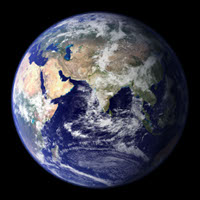Peace and Environment News — Insider, April–June 2013
by Mike Buckthought
Melting Sea Ice
 Researchers are using satellite data to measure the loss of Arctic sea ice. Between the autumn of 2003 and the autumn of 2012, the volume of Arctic sea ice has declined by 36 percent. “The data reveals that thick sea ice has disappeared from a region to the north of Greenland, the Canadian Archipelago, and to the northeast of Svalbard,” says Katharine Giles, a member of the international scientific team. The researchers used data from the European Space Agency’s CryoSat-2 satellite, and NASA’s ICESat satellite. (American Geophysical Union, February 13, 2013; Geophysical Research Letters, February 28, 2013)
Researchers are using satellite data to measure the loss of Arctic sea ice. Between the autumn of 2003 and the autumn of 2012, the volume of Arctic sea ice has declined by 36 percent. “The data reveals that thick sea ice has disappeared from a region to the north of Greenland, the Canadian Archipelago, and to the northeast of Svalbard,” says Katharine Giles, a member of the international scientific team. The researchers used data from the European Space Agency’s CryoSat-2 satellite, and NASA’s ICESat satellite. (American Geophysical Union, February 13, 2013; Geophysical Research Letters, February 28, 2013)
Canada’s Disappearing Glaciers
A fifth of the glaciers in Canada’s Arctic Archipelago could disappear by the year 2100 because of global warming, according to a study published in Geophysical Research Letters. The melting of the glaciers will raise sea levels by an estimated 3.5 cm by the end of the century. The study is based on a global temperature increase of 3 degrees Celsius, corresponding to an increase of 8 degrees Celsius in the Arctic. The Canadian Arctic Archipelago contains the third largest volume of glacier ice, after Antarctica and Greenland. (Agence France Presse, March 7, 2013; Geophysical Research Letters, March 7, 2013)
Experimental Lakes Area
Scientists are urging the Harper government to cancel plans to mothball the world-renowned Experimental Lakes Area (ELA) research facility in northern Ontario. A number of international environmental research projects are based at the facility. However, scientists have been unable to get clear answers about the fate of the ELA. According to the Department of Fisheries and Oceans, the ELA will no longer receive funding past the end of March. Closing the ELA threatens key research projects, including the Mercury Experiment to Assess Atmospheric Loading in Canada and the United States (METAALICUS) project. This international initiative studies the bioaccumulation of mercury. (CBC News, March 20, 2013)
Protests in Greece
On March 9, over 20,000 people took to the streets of Thessaloniki, Greece, to demonstrate against a Canadian company’s mining project. There is strong opposition to Vancouver-based Eldorado Gold’s plan to excavate a gold mine in Halkidiki, a picturesque peninsula in northern Greece. Opposition to the project is growing, with many people blocking access to roads leading to the site. Residents of Halkidiki are concerned about the health and environmental impacts of toxic chemicals such as arsenic and cyanide. The mine could also threaten the livelihoods of people who depend on tourism and agriculture. (Alterthess, March 9, 2013)
Solar Glass Generates Electricity
The British company Oxford Photovoltaics has developed transparent solar panels that can be incorporated in the walls and roofs of buildings to generate electricity. The panels are made by screen printing a thin layer of solar cell materials on glass. Because the panels are made from glass, they are transparent. The panels can be integrated into the facades of existing or new buildings. The company is gearing up to build a manufacturing plant, with trials planned for the end of 2014. (The Guardian, February 12, 2013; Oxford Photovoltaics http://www.oxfordpv.com)
Mike Buckthought is a writer based in Ottawa.
Published in the Peace and Environment News Insider, Volume 28, Number 2, April–June 2013, page 8.